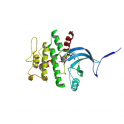
- Remove this product from my favorite's list.
- Add this product to my list of favorites.
Products
Viewed products
Newsletter
 |  |  |  |  |  |

Background: MKK4 is a dual specificity kinase belonging to the group of MAP kinase kinase (MKKs). MKKs are one part of three-kinase phosphorelay system “MAPK cascade” that converts extra cellular stimuli into various cellular responses such as gene expression, mitosis, and differentiation, proliferation, and cell survival/apoptosis. MKK4 as well as MKK7 are critical upstream activators of JNK signalling required for developmental programmes and responses to various extracellular stimuli.
Upon phosphorylation at Ser and Thr residues within a Ser-X-Ala-Lys-Thr motif in their activation loops by MKKKs (e.g. ASK, MEKK, MLK, and TAK) activated MKK4 is able to in turn activate JNK by dual phosphorylation of the Thr-Pro-Tyr motif. Biochemical analyses of JNK signalling revealed, that MKK4 and MKK7 cooperate in activation process of JNK. Upon phosphorylation of the Tyr residue mediated by MKK4 full activation of JNK is achieved by Thr-phosphorylation triggered by MKK7. Whereas MKK3 and MKK6 are specific p38MAPK activators different studies showed that p38α is regulated by MKK4 too. MKK4 is involved in a variety of physiological and pathophysiological processes, especially in the nervous system, heart, immune system and the development of cancer.
Recent studies revealed, that over expression of the mkk4 gene in an ovarian cancer line is linked with a reduced proliferative activity and increased apoptosis, indicating that MKK4 acts as a tumor suppressor and may represent an important therapeutic target for the treatment of ovarian cancer.
Protein is not phosphorylated and activated by MKKKs. Suitable as substrate for use in kinase activity assays, for kinase binding assays and for western blot analyses.
Theoretical MW: MEK4 / MKK4 (Fusion Protein): 45.9 kDa
Expression system: E.coli
Purification: One-step affinity purification using immobilized metal affinity chromatography (IMAC) resin charged with cobalt.
Purity: >90% (The purified fusion protein was analyzed on Coomassie stained SDS gel.)
Protein concentration: 0.23 mg/ml
Storage buffer: 20 mM Tris-HCl, 150 mM NaCl, 1 mM DTT, 20 % glycerol, pH8.0
Ordering information: shipped on dry ice
Entrez Gene ID: 6416
UniProtKB: P45985
Haeusgen W, Herdegen T, Waetzig V.(2011) „The bottleneck of JNK signaling: molecular and functional characteristics of MKK4 and MKK7.” Eur J Cell Biol.90(6-7):536-44.
Taylor JL, Szmulewitz RZ, Lotan T, Hickson J, Griend DV, Yamada SD, Macleod K, Rinker-Schaeffer CW.(2008) “New paradigms for the function of JNKK1/MKK4 in controlling growth of disseminated cancer cells.” Cancer Lett. ;272(1):12-22.
Asaoka Y, Nishina H.(2010) “Diverse physiological functions of MKK4 and MKK7 during early embryogenesis.” J Biochem. ;148(4):393-401.
Remy G, Risco AM, Iñesta-Vaquera FA, González-Terán B, Sabio G, Davis RJ, Cuenda A. (2010) “Differential activation of p38MAPK isoforms by MKK6 and MKK3.” Cell Signal. 22(4):660-7.
Yeasmin S, Nakayama K, Rahman MT, Rahman M, Ishikawa M, Katagiri A, Iida K, Nakayama N, Miyazaki K.(2011) “MKK4 acts as a potential tumor suppressor in ovarian cancer.” Tumour Biol. 32(4):661-70.
Recombinant human JNK2 / MAPK9, protein kinase, 40 µg - 255,00 €
Recombinant human MAP kinase 14 / p38 alpha, unactive, 20 µg - 295,00 €
Recombinant human mitogen-activated protein kinase kinase 1 (MEK1), 10 µg - 295,00 €
Recombinant human mitogen-activated protein kinase kinase 6 (MKK6), active, 20 µg - 295,00 €
Follow us